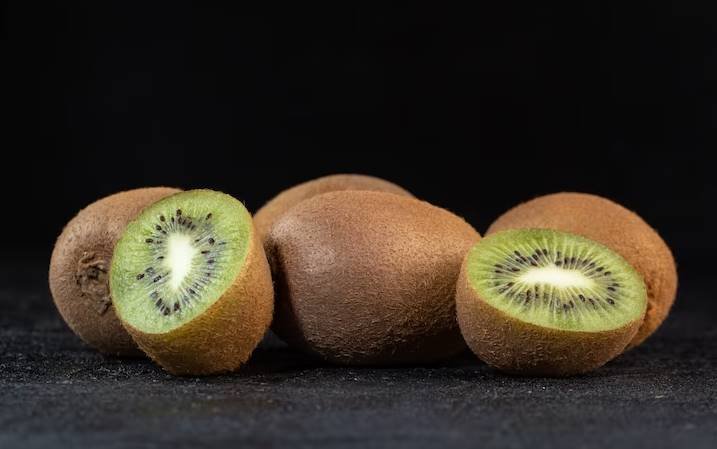As an experienced dietitian, I can’t stress enough how vital it is to understand the nutritional content of the foods we consume daily. One such food that has garnered attention recently is the kiwi, a small green fruit known for its vibrant taste and nutrient-rich profile. This article aims to shed light on a specific aspect of this fruit’s nutritional profile: its sugar content.
Have you ever wondered, “How much sugar is in a kiwi?” Well, the answer might surprise you. A typical kiwi contains about 6.7 grams of sugar per 100 grams, which is relatively low compared to many other fruits. This natural sugar, along with other nutrients in kiwi, contributes to the overall health benefits of consuming this fruit. By understanding the sugar content and overall nutritional profile of kiwi, you can make informed decisions about incorporating it into your diet. So, let’s delve deeper into this topic and explore the wonderful world of kiwi nutrition!
What Makes Kiwi a Healthy Choice?
Kiwis are a powerhouse of essential nutrients that significantly contribute to our overall health. They are packed with vitamins, minerals, and dietary fiber, making them an excellent addition to a balanced diet. These small, fuzzy fruits are not just delicious but also offer numerous health benefits. The nutritional value of kiwi includes its high vitamin C content, which is crucial for boosting the immune system, enhancing skin health, and reducing the risk of chronic diseases.

Kiwi is also rich in dietary fiber, which aids digestion and helps maintain a healthy gut. It’s low in calories and fat, making it a perfect snack for those who are watching their weight or aiming for weight loss. Moreover, kiwi contains natural enzymes that can help break down proteins and aid digestion, making it beneficial for people with digestive issues.
According to recent studies, consuming two kiwis a day can improve cardiovascular health and reduce the risk of stroke. Research shows that eating kiwis can lower blood pressure and reduce blood clotting. This power-packed fruit is indeed a healthy choice for most individuals, offering a myriad of health benefits beyond its sugar content.
Nutritional Profile of a Kiwi
A kiwi fruit’s nutritional profile is incredibly diverse and rich, making it an excellent choice for those seeking healthful dietary options. This small fruit packs a punch when it comes to its contents. From vitamins and minerals to fiber and natural sugars, kiwis offer a wide range of nutrients that contribute to our overall well-being.
Here’s a breakdown of the nutritional value per 100 grams of kiwi:
Calories: 61
Protein: 1.14 grams
Fat: 0.52 grams
Carbohydrates: 14.66 grams
Fiber: 3 grams
Sugars: 8.92 grams
Vitamin C: 92.7 milligrams
Vitamin K: 40.3 micrograms
Vitamin E: 1.46 milligrams
Potassium: 312 milligrams
These numbers highlight the balanced nutrient composition of kiwis. While they are relatively low in protein and fat, they are high in essential vitamins and minerals, particularly Vitamin C and Vitamin K. They also contain a significant amount of fiber and natural sugars, contributing to their sweet taste and numerous health benefits.
In addition to these nutrients, kiwis also contain several phytochemicals, including flavonoids and carotenoids, which have antioxidant properties. These compounds can help neutralize harmful free radicals in the body, reducing the risk of chronic diseases. When considering all these factors, it’s clear that the nutritional profile of a kiwi is indeed impressive, offering a balance of essential nutrients beneficial for overall health.
Understanding the Sugar Content in Kiwi
When it comes to the sugar content in kiwi, it’s important to understand that not all sugars are created equal. The sugar found in fruits like kiwi is naturally occurring and is accompanied by fiber, water, and various beneficial compounds. Therefore, it is much healthier than refined sugar.
A typical kiwi contains about 8.92 grams of sugar per 100 grams. To put this into perspective, an average-sized kiwi weighs around 76 grams, which means it contains approximately 6.77 grams of sugar. This is a moderate amount compared to other fruits. For instance, the same weight of grapes contains about 16 grams of sugar, and apples contain about 10 grams of sugar.

However, the sugar in kiwi, like that in all fruits, is not just plain fructose. It’s packaged along with fiber and a host of other nutrients, which help slow down the absorption of sugar into your bloodstream and prevent spikes in blood sugar levels. So, despite its sugar content, kiwi can still be a part of a balanced diet, offering a sweet taste without the negative effects of added sugars.
How Does Kiwi Compare to Other Fruits in Terms of Sugar?
When considering the sugar content of various fruits, kiwi holds a moderate position. It offers a sweet taste without carrying an excessive amount of sugar, making it a healthier choice compared to some other fruits. This balance is what makes kiwi a popular choice for those who want to enjoy the sweetness of fruit but are mindful of their sugar intake.
To put this into perspective, let’s compare the sugar content of kiwi with that of some other commonly consumed fruits per 100 grams:
Bananas: 17.2 grams of sugar
Apples: 10.4 grams of sugar
Oranges: 9.2 grams of sugar
Strawberries: 4.9 grams of sugar
Kiwis: 8.9 grams of sugar
As you can see, kiwi falls in the middle range, offering less sugar than bananas and apples but slightly more than strawberries. However, remember that the sugar in these fruits is naturally occurring and comes with a host of other beneficial nutrients.
The comparison of kiwi with other fruits in terms of sugar content highlights its balanced nutritional profile. While it offers a sweet taste, the sugar content is not excessively high, making it a suitable choice for those monitoring their sugar intake. Moreover, the natural sugars in kiwi come with fiber, vitamins, and antioxidants, providing a nutritious package overall.
The Health Implications of Sugar in Kiwi
Considering the sugar content in kiwi, it’s important to understand its health implications. The sugars in kiwi are naturally occurring, unlike added sugars found in processed foods. These natural sugars, coupled with the fruit’s high fiber content, help slow the absorption of sugar into the bloodstream, leading to a steady energy release rather than a sugar spike and crash.
The moderate sugar content in kiwi also means that it can be included in a balanced diet without significantly increasing daily sugar intake. However, like all foods, kiwis should be consumed in moderation. Overconsumption of any fruit can lead to excessive sugar intake, which can have negative health effects, such as weight gain and increased risk of type 2 diabetes.
While research is still ongoing, current studies suggest that the consumption of fruits like kiwi, despite their sugar content, is associated with health benefits rather than risks. For instance, a study published in the journal PLoS Medicine found that higher fruit consumption is linked to lower risks of heart disease, stroke, and premature death. This is likely due to the combination of nutrients found in fruits, including dietary fiber, vitamins, minerals, and antioxidants. In this context, the sugar content in kiwi can be viewed as part of a complex nutritional package that contributes to overall health when consumed as part of a balanced diet.
To Wrap Up
In conclusion, kiwi is a fruit that offers a variety of health benefits due to its rich nutritional profile. Despite containing sugar, it’s important to remember that the sugars present in kiwi are natural and come with a host of other nutrients, including fiber, vitamins, and minerals. Therefore, when consumed in moderation as part of a balanced diet, kiwi can contribute to overall well-being and health.
So next time you’re looking for a nutritious snack or want to add a sweet touch to your meals, consider reaching for a kiwi. Its unique combination of sweetness, nutrition, and health benefits is sure to bring a smile to your face.
Frequently Asked Questions
How much sugar does a kiwi contain?
Is the sugar in kiwi harmful?
Can people with diabetes eat kiwi?
How does the sugar content in kiwi compare to other fruits?
Are there any health benefits associated with eating kiwi?
Can I eat kiwi if I'm trying to lose weight?





















